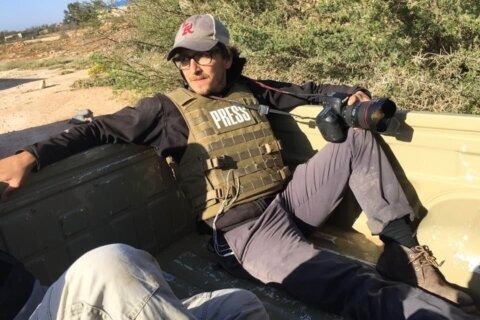WASHINGTON — “Native American sovereignty isn’t unconstitutional. It’s pre-constitutional.”

That’s the closing argument of the new play “Sovereignty” at Arena Stage (Jan. 12-Feb. 18), including a Q&A on Sunday with playwright Mary Kathryn Nagle and activist Gloria Steinem.
“Gloria Steinem is a dear friend of Mary Kathryn Nagle’s,” actress Kyla Garcia told WTOP, to which co-star Jake Waid added, “It totally makes sense that they’re friends. They met on the front lines. They are two feminists that are going to go down in history for leading the charge.”
The story unfolds over two parallel timelines. In present day Oklahoma, a young Cherokee lawyer, Sarah Ridge Polson (Garcia), builds a Supreme Court case to restore tribal jurisdiction with colleague Jim Ross (Waid). This is juxtaposed with 1835 Cherokee Nation (present-day Georgia), where their grandfathers, John Ridge (Kalani Queypo) and John Ross (Waid), become historic rivals during passage of the Treaty of New Echota, which enabled the Trail of Tears.
“We’re both direct descendants,” Waid said. “To make an analogy, the Hatfields and McCoys, the Rosses and Ridges. To this day, there’s a bit of animosity. … They’ll be coming to the show, so we’ll have Rosses and Ridges in the audience. That’s really exciting to see their stories told.”
As the plot twists and turns from violent outbursts to healing monologues, the title becomes a provocative double meaning for the sovereignty of both tribal territory and women’s bodies.
“They go hand-in-hand,” Garcia said. “When the Standing Rock Sioux protested [the Dakota Access Pipeline] they said, ‘Protect our water, protect our women.’ … When oil companies come in to build a pipeline, they build these man camps [and] the rates of attacks, assaults, murders, kidnappings triple! That’s why they’re not just saying protect our water [but] protect our women. If you destroy the women and children of a nation, you destroy the people.”
These intertwining themes were similarly explored in Taylor Sheridan’s “Wind River” (2017), but unlike that film, “Sovereignty” is actually written by a Native American. Nagle is the great, great, great, great granddaughter of Major Ridge and John Ridge, just like Garcia’s character.
“She is the direct descendant,” Garcia said. “Not only is this story being told, it’s being told by the person whose family experienced this. ‘Wind River’ was a wonderful movie … but it wasn’t written by a native. … That’s such a huge part of native culture: oral history. … She heard this story of her grandfathers her entire life. If someone else had written this play that wasn’t her, think about all of the things that might be incorrect or might not reflect her experience.”
Likewise, Garcia and Waid bring their own Native American heritage to the piece.
“My father’s mother is Taíno,” Garcia said. “The Taíno Indians are descendants of the Arawak Indians, which were the first natives to come into contact with Columbus. They’re local to Puerto Rico. Then, my mother is entirely of European descent, so I find that I have both cultures culminating in my bloodlines. It’s interesting; I feel that the wars that were fought in those bloodlines are still happening, but not on the battlefield — they’re in the courtroom.”
Meanwhile, Waid grew up in Alaska as a descendant of the Tlingit tribe.
“I’ve been acting for 20-25 years, which is long enough to see a huge change in the business,” Waid said. “Even 10-15 years ago, you’d say ‘yes’ to things where they say, ‘Put on this wig.’ ‘Should we hang some feathers on that?’ ‘Could you look maybe stoic?’ You’re portraying an outsider’s perspective of what a Native American is. I’ve been told I’m not native enough.”
In fact, Waid was actually cast in his first play by Molly Smith, who was directing a Bible adaptation called “Genesis” in Juno, Alaska. Now, it’s Smith who directs “Sovereignty” as part of Arena Stage’s ambitious “Power Plays” initiative to produce 25 new plays over 10 years.
“We’re getting reactions from the audience [where] they’re upset,” Waid said. “We’ve had people say, ‘I can’t believe this. I can’t believe this happened and this is still happening.'”
This initial shock is an important step toward awareness, then hopefully change.
“In Germany, they teach their children deeply about what happened in World War II,” Garcia said. “America doesn’t do that. America is built on Native American genocide and African-American slavery. As much as I love being American and I love this country, we are built on a mass grave and we don’t talk about it. … It’s about healing and forgiveness. Even though these old wounds run deep, when we face our past and we face our shame, we can heal from it.”
Click here for more on “Sovereignty.” Hear our full chat with Kyla Garcia and Jake Waid below:









